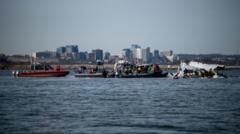In a shocking turn of events, a mid-air collision between a military helicopter and a passenger plane in Washington, DC, has raised serious concerns over air traffic control staffing. Transportation Secretary Sean Duffy stated that staffing levels were “not normal” during the incident, which resulted in the tragic loss of 67 lives. Reports suggest that the control tower at Reagan National Airport was understaffed, with only one air traffic controller managing both helicopters and planes—tasks typically assigned to two people. Duffy emphasized the need for a thorough review, questioning whether traffic was managed appropriately and why a military flight operated during peak air traffic hours. Investigators are probing various factors, including flight altitude and timing, as part of their inquiry. Family members of victims gathered at the crash site to pay their respects, while Duffy acknowledged ongoing challenges with air traffic controller understaffing across the US. He is working with the FAA to train new controllers, promising a future plan for improvement, but noted that fixing the system won't happen overnight.
Concerns Rise Over Air Traffic Control Staffing After Deadly DC Crash

Concerns Rise Over Air Traffic Control Staffing After Deadly DC Crash
Air traffic control staffing was deemed "not normal" during a tragic mid-air collision in Washington, leading to calls for reform.
In the wake of a mid-air collision that claimed 67 lives, Transportation Secretary Sean Duffy highlighted staffing issues in air traffic control, raising alarms about safety in the skies.
In a shocking turn of events, a mid-air collision between a military helicopter and a passenger plane in Washington, DC, has raised serious concerns over air traffic control staffing. Transportation Secretary Sean Duffy stated that staffing levels were “not normal” during the incident, which resulted in the tragic loss of 67 lives. Reports suggest that the control tower at Reagan National Airport was understaffed, with only one air traffic controller managing both helicopters and planes—tasks typically assigned to two people. Duffy emphasized the need for a thorough review, questioning whether traffic was managed appropriately and why a military flight operated during peak air traffic hours. Investigators are probing various factors, including flight altitude and timing, as part of their inquiry. Family members of victims gathered at the crash site to pay their respects, while Duffy acknowledged ongoing challenges with air traffic controller understaffing across the US. He is working with the FAA to train new controllers, promising a future plan for improvement, but noted that fixing the system won't happen overnight.





















